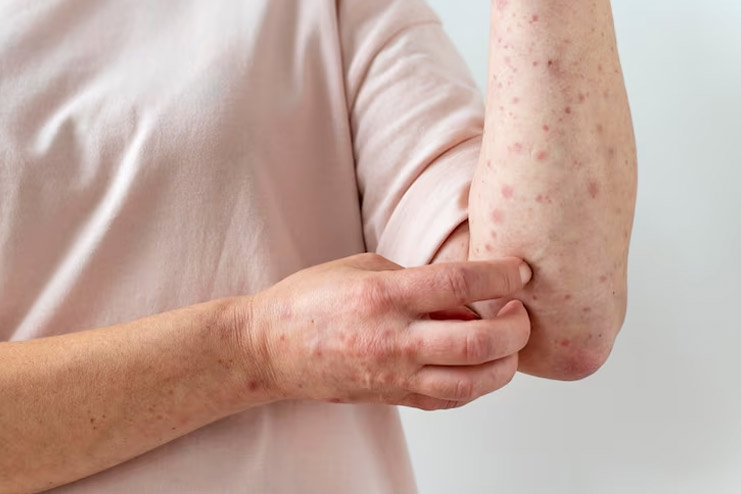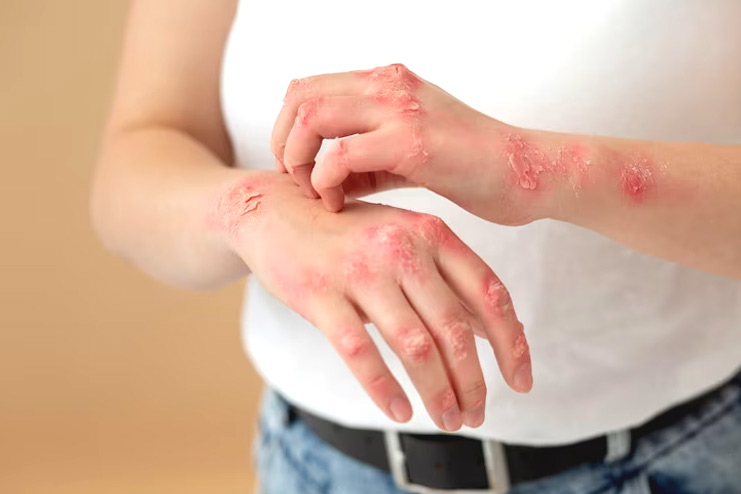Affiliate Disclaimer
Some links in this article are affiliate links. We may earn a small commission if you make a purchase through these links, at no extra cost to you. We only recommend products we find useful to our readersStress and skin conditions share a significant connection, as numerous studies have revealed. Stress acts as a trigger or exacerbating factor for various skin issues like acne, eczema, psoriasis, and rosacea. Hormones released during stress, such as cortisol, disrupt the skin’s balance, leading to inflammation, excessive oil production, compromised skin barrier, and slower wound healing.
Addressing stress is vital for maintaining healthy skin. While topical treatments are important, managing the root cause yields more sustainable results. Incorporating stress reduction techniques, self-care practices, and mindfulness promotes overall skin vitality.
This article explores the impact of stress on skin, specific conditions influenced by it, and practical strategies for stress management to enhance skin health. Gain insights to achieve healthier, happier skin.
Stress and Skin: Unraveling the Link


Stress triggers a cascade of physiological responses in our bodies, including the release of stress hormones like cortisol. These hormonal changes have a profound impact on the health and appearance of our skin.
Increased Inflammation and Sensitivity:


Stress stimulates inflammatory pathways, leading to heightened inflammation in the body and the skin. This can result in redness, irritation, and increased sensitivity, making the skin more prone to various skin conditions and reactions.
Impaired Barrier Function:
Stress disrupts the skin’s natural barrier function, compromising its ability to retain moisture and protect against external irritants. This weakened barrier allows for increased water loss, dryness, and a higher risk of developing skin infections or allergies.
Accelerated Aging Processes:
Chronic stress can accelerate the aging process of the skin. Increased cortisol levels break down collagen and elastin, essential proteins responsible for maintaining skin elasticity and firmness. This leads to the formation of fine lines, wrinkles, and sagging skin.
Aggravation of Existing Skin Conditions:
For individuals with pre-existing skin conditions like acne, eczema, psoriasis, or rosacea, stress can exacerbate these conditions. Stress can trigger flare-ups, intensify symptoms, and prolong the healing process, making it crucial to address stress as part of their management plan.
Understanding how stress impacts the skin provides valuable insights into developing effective strategies for managing and improving skin health. By implementing stress reduction techniques and adopting a holistic approach to skincare, individuals can minimize the negative effects of stress on their skin and promote a healthier complexion.
Common Skin Conditions Exacerbated by Stress
1. Acne and Breakouts:


Stress Hormones and Sebum Production:
Stress triggers the release of hormones, such as cortisol, which stimulates the sebaceous glands to produce more sebum. Excessive sebum, combined with dead skin cells and bacteria, clogs the pores, leading to the formation of acne.
Inflammation and Pore Clogging:
Stress-induced inflammation worsens acne by promoting the production of pro-inflammatory substances. This can result in red, swollen, and painful breakouts. Moreover, stress can disrupt the natural skin shedding process, further contributing to pore clogging.
Effective Stress Management Techniques for Acne-prone Skin:
To manage acne-prone skin affected by stress, adopting stress management techniques is essential. These may include practicing relaxation techniques like deep breathing, engaging in regular physical activity, getting adequate sleep, maintaining a healthy diet, and incorporating skincare products with anti-inflammatory ingredients.
By understanding the interplay between stress and acne, individuals can tailor their skincare routines and stress management practices to minimize breakouts and promote clearer, healthier skin.
2. Eczema and Atopic Dermatitis:


Stress as a Trigger for Flare-ups:
Stress is known to trigger or worsen flare-ups of eczema and atopic dermatitis. Emotional stress can disrupt the skin’s barrier function, leading to increased sensitivity, dryness, and itchiness. This can result in a vicious cycle of scratching and inflammation, exacerbating the condition.
The Role of the Immune System:
Stress can affect the immune system, leading to an overactive response in individuals with eczema. This heightened immune activity can further contribute to inflammation and aggravate eczema symptoms.
Calming Techniques for Eczema Relief:
To manage eczema and minimize stress-related flare-ups, incorporating calming techniques is crucial. This may involve practicing stress reduction methods such as meditation, mindfulness, and deep relaxation exercises. Additionally, maintaining a consistent skincare routine, using gentle and moisturizing products, and avoiding triggers can help soothe and manage eczema symptoms.
By addressing stress and adopting relaxation techniques, individuals with eczema can support their immune system, reduce inflammation, and potentially minimize flare-ups, leading to improved comfort and overall skin health.
3. Psoriasis:


Stress and Psoriasis Flare-ups:
Stress is a significant trigger for psoriasis flare-ups, causing the symptoms to worsen or become more frequent. Individuals with psoriasis often experience an increase in red, itchy, and scaly patches during stressful periods.
Inflammatory Pathways and Stress Response:
Stress activates inflammatory pathways in the body, which can exacerbate the immune system’s response in individuals with psoriasis. This leads to an accelerated turnover of skin cells and the formation of thick, inflamed patches characteristic of psoriasis.
Stress Reduction Strategies for Psoriasis Management:
Effectively managing stress is crucial in controlling psoriasis symptoms. Strategies may include practicing relaxation techniques like yoga or meditation, engaging in regular exercise, getting sufficient sleep, and seeking support from therapists or support groups. Additionally, incorporating stress-reducing activities such as hobbies, spending time in nature, and maintaining a balanced lifestyle can also contribute to psoriasis management.
By addressing stress and implementing stress reduction strategies, individuals with psoriasis can potentially reduce the frequency and severity of flare-ups, leading to improved skin comfort and a better quality of life.
4. Rosacea:


The Impact of Stress on Rosacea Symptoms:
Stress has a significant impact on rosacea symptoms, often triggering or exacerbating flare-ups. Many individuals with rosacea report that stress can lead to increased facial redness, flushing, and the appearance of visible blood vessels.
Neurovascular Dysregulation and Stress:
Stress plays a role in neurovascular dysregulation, which is associated with rosacea. The stress response can cause blood vessels in the face to dilate, leading to flushing and heightened skin sensitivity. This can contribute to the persistent redness and inflammation seen in rosacea.
Stress-Relief Techniques to Manage Rosacea:
Managing stress is crucial for effectively managing rosacea symptoms. Incorporating stress-relief techniques can include practices such as deep breathing exercises, progressive muscle relaxation, avoiding triggers like hot beverages or spicy foods, and seeking emotional support through therapy or counseling. Additionally, practicing gentle skincare, using mild and non-irritating products, and protecting the skin from excessive sun exposure can aid in rosacea management.
By addressing stress and implementing stress-relief techniques, individuals with rosacea can potentially reduce the frequency and intensity of flare-ups, leading to improved skin appearance and overall well-being.
Understanding the Mind-Body Connection


1. The Bidirectional Relationship Between Stress and Skin:
The relationship between stress and skin conditions is bidirectional, meaning that stress can both influence and be influenced by skin health. While stress can exacerbate skin conditions, the presence of skin issues can also contribute to increased stress levels. Understanding this interconnected relationship is crucial for managing both stress and skin conditions effectively.
2. The Role of Neurotransmitters and Hormones:
Neurotransmitters and hormones play a significant role in the mind-body connection between stress and skin. Stress triggers the release of neurotransmitters like cortisol and neuropeptides, which can impact skin functions, including inflammation, oil production, and wound healing. Additionally, hormonal changes during stress can further affect skin health and contribute to the development or aggravation of various skin conditions.
3. Psychodermatology: The Interplay of Mental Health and Skin Conditions:


Psychodermatology explores the interplay between mental health and skin conditions. It recognizes the profound impact of psychological factors, such as stress, anxiety, and depression, on the onset, severity, and management of skin conditions. Integrating psychological interventions, such as cognitive-behavioral therapy and mindfulness techniques, alongside traditional dermatological treatments, has shown promising results in improving both mental well-being and skin health.
By understanding the mind-body connection and the role of neurotransmitters, hormones, and psychodermatology, individuals can develop a more comprehensive approach to managing stress and skin conditions. This holistic approach addresses both the physical and psychological aspects, leading to improved overall well-being and skin health.
Effective Stress Management Techniques for Healthy Skin
1. Lifestyle Modifications for Stress Reduction:


Regular Exercise and Physical Activity:
Engaging in regular exercise and physical activity is an effective way to manage stress and promote healthy skin. Exercise releases endorphins, which are natural mood enhancers, and helps reduce stress hormones like cortisol. Aim for at least 30 minutes of moderate-intensity exercise most days of the week, such as brisk walking, jogging, cycling, or yoga.
Adequate Sleep and Rest:
Getting sufficient sleep and rest is crucial for stress management and maintaining healthy skin. Lack of sleep can increase stress levels and negatively impact skin health. Aim for 7-9 hours of quality sleep each night. Establish a relaxing bedtime routine, create a conducive sleep environment, and prioritize a consistent sleep schedule.
Balanced Diet and Proper Nutrition:
Eating a balanced diet that is rich in fruits, vegetables, whole grains, lean proteins, and healthy fats provides essential nutrients for optimal skin health and stress management. Avoid excessive consumption of processed foods, sugary snacks, and caffeinated beverages, as they can contribute to stress and skin issues. Stay hydrated by drinking an adequate amount of water throughout the day.
By incorporating these lifestyle modifications, individuals can effectively manage stress levels and support healthy skin. Consistent exercise, quality sleep, and a balanced diet work synergistically to promote overall well-being and enhance the skin’s natural radiance.
2. Mind-Body Practices for Stress Relief:


Meditation and Deep Breathing Exercises:
Meditation and deep breathing exercises are powerful techniques for calming the mind, reducing stress, and promoting relaxation. Find a quiet and comfortable space, focus on your breath, and allow yourself to be fully present in the moment. Deep breathing exercises can be practiced anywhere, providing immediate relief during stressful situations.
Yoga and Stretching:
Yoga combines physical movement, breath control, and mindfulness, making it an effective stress management tool. Regular yoga practice helps release tension, improve flexibility, and promote a sense of inner calm. Engaging in stretching exercises, whether through yoga or dedicated stretching routines, can also help relieve muscle tension and reduce stress.
Mindfulness and Cognitive Behavioral Therapy:
Mindfulness involves cultivating non-judgmental awareness of the present moment, which can help reduce stress and promote emotional well-being. Cognitive Behavioral Therapy (CBT) is a therapeutic approach that helps identify and change negative thought patterns and behaviors. Both mindfulness and CBT techniques can be beneficial in managing stress and improving overall mental health.
Incorporating mind-body practices into your daily routine allows for intentional relaxation, stress reduction, and better management of skin-related concerns. By making these practices a regular part of your life, you can cultivate a greater sense of well-being and support the health of your skin.
3. Skincare and Self-Care Rituals for Stress Reduction:


Choosing the Right Skincare Products:
Selecting skincare products suitable for your skin type and concerns is essential for maintaining skin health and reducing stress. Look for products with gentle, non-irritating ingredients that nourish and protect the skin. Avoid harsh chemicals and potential allergens that can further exacerbate stress-related skin issues.
Establishing a Relaxing Skincare Routine:
Create a soothing and relaxing skincare routine that doubles as a self-care ritual. Dedicate time each day to cleanse, moisturize, and protect your skin. Make it a mindful practice by focusing on the sensations and giving yourself permission to unwind. Incorporate facial massages or gentle facial yoga techniques to relieve tension and enhance relaxation.
Incorporating Self-Care Practices into Daily Life:
In addition to skincare, prioritize self-care practices to reduce stress. This can include activities such as taking breaks throughout the day to engage in deep breathing or stretching exercises, engaging in hobbies that bring you joy, spending time in nature, connecting with loved ones, practicing gratitude, and setting boundaries to maintain a healthy work-life balance.
By integrating skincare and self-care rituals into your daily life, you create moments of tranquility and promote stress reduction. These practices nourish not only your skin but also your overall well-being, allowing you to cultivate a healthier and more balanced lifestyle.
Conclusion


Managing stress is of utmost importance for maintaining healthy skin. The intricate relationship between stress and skin conditions highlights the need to address stress as a crucial factor in promoting skin health. By understanding the impact of stress on the skin, individuals can take proactive steps to manage stress and mitigate its effects on their skin. Empowering yourself with knowledge and implementing effective stress management techniques allows you to take control of your well-being and improve your skin health. By adopting lifestyle modifications, engaging in mind-body practices, incorporating self-care rituals, and selecting appropriate skincare products, you can create a holistic approach that nurtures both your mind and your skin.
Remember, everyone’s journey to managing stress and achieving healthy skin is unique. Experiment with different techniques, listen to your body, and seek professional guidance when needed. By prioritizing stress reduction and adopting practices that support your overall well-being, you can embark on a path towards healthier skin and a more balanced and fulfilling life.
Frequently Asked Questions (FAQs)


1. How does stress affect the skin’s natural barrier?
Stress can disrupt the skin’s natural barrier function, leading to increased sensitivity, dryness, and a compromised ability to retain moisture. This can make the skin more prone to irritation, inflammation, and the penetration of harmful substances.
2. Can stress cause permanent skin damage?
While stress can have a significant impact on the skin, it generally does not cause permanent damage on its own. However, chronic or severe stress can exacerbate existing skin conditions and contribute to long-term skin issues if left unmanaged.
3. What are some signs that stress is affecting my skin?
Signs that stress is affecting the skin may include increased redness, sensitivity, breakouts, dryness, itchiness, or a worsening of existing skin conditions. Stress can also manifest as premature aging, dull complexion, and overall poor skin health.
4. Are there any specific skincare ingredients that help with stress-related skin issues?


Certain skincare ingredients can help alleviate stress-related skin issues. Ingredients like antioxidants, hyaluronic acid, niacinamide, and soothing botanical extracts such as chamomile or aloe vera can help calm and nourish stressed skin.
5. Can reducing stress improve existing skin conditions?
Yes, reducing stress can have a positive impact on existing skin conditions. By managing stress levels, individuals may experience a reduction in inflammation, improved barrier function, and better overall skin health, leading to a potential improvement in existing skin conditions.
6. Can stress cause skin conditions to develop in the first place?
While stress alone may not directly cause skin conditions, it can act as a trigger or exacerbating factor for various skin issues. Stress can disrupt the immune system, increase inflammation, and affect hormonal balance, all of which can contribute to the development or worsening of skin conditions.
7. How long does it take for stress-related skin conditions to improve?
The time it takes for stress-related skin conditions to improve can vary depending on the individual, the severity of the condition, and the effectiveness of stress management techniques. With consistent stress reduction measures and proper skincare, improvements can be seen over a period of weeks to months.
8. Can stress cause hair loss and scalp issues?


Yes, stress can contribute to hair loss and scalp issues. Chronic or severe stress can disrupt the hair growth cycle, leading to excessive shedding or thinning of the hair. Stress can also trigger scalp conditions such as dandruff, itchiness, or scalp inflammation.
9. What role does diet play in managing stress-related skin conditions?
A balanced and nutritious diet plays a vital role in managing stress-related skin conditions. Consuming a diet rich in fruits, vegetables, whole grains, lean proteins, and healthy fats provides essential nutrients that support skin health and overall well-being. Avoiding excessive intake of sugary and processed foods can also help manage inflammation and skin issues.
10. Are there any medications that can help with stress-induced skin issues?
In some cases, dermatologists may prescribe medications such as topical corticosteroids, immunosuppressants, or acne medications to manage stress-induced skin issues. However, medication should be considered alongside stress management techniques and used under the guidance of a healthcare professional.




























